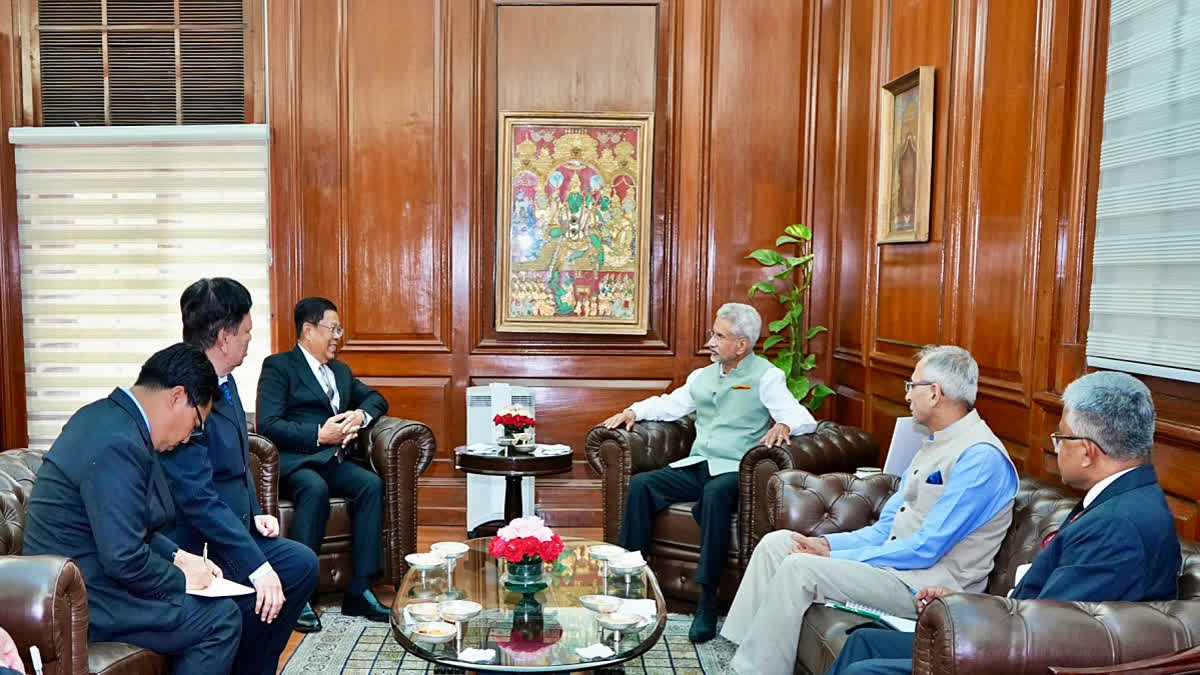New Delhi: A blockade imposed by a Mizoram-based civil society organisation amidst a conflict that has arisen between two ethnic resistance forces in civil war-torn Myanmar is changing the dynamics along the India-Myanmar border.
Lawngtlai, Mizoram-based civil society organisation Central Young Lai Association (CYLA) has imposed a blockade on import of essential goods from India to Rakhine State in Myanmar due to the Arakan Army ethnic resistance group’s control over the vital Paletwa Township in Myanmar’s Chin State. This has sparked a conflict pitting the Chinland Council and the Chin National Army on one side and the Arakan Army and a splinter Chin group called Chin Brotherhood on the other.
Why this will be a cause for New Delhi is because Paletwa is a vital cog in the India-funded Kaladan Multi-Modal Transit Transport Project (KMTTP). The KMTTP connects the port of Haldia in West Bengal with the port of Sittwe in Myanmar that was built with funding from India. The corridor then links Sittwe with Paletwa town in Chin State of Myanmar via the Kaladan river boat route. Paletwa is then linked with Mizoram in northeastern India by road. All components of the project, including the Sittwe port, have been completed, except the under-construction Zorinpui(Mizoram)-Paletwa road.
What is the CYLA and who does it represent?
The CYLA is an influential south Mizoram-based civil society organisation and represents the Lai people, an indigenous ethnic group primarily residing in the Chin State of Myanmar and in parts of northeastern India, particularly in Mizoram and Manipur. They are part of the broader Chin ethnic group but have distinct cultural and linguistic identities. Lawngtlai, where the CYLA is based, also serves as the headquarters of the Lai Autonomous District Council in southern Mizoram bordering Myanmar.
Why has the CYLA imposed the blockade on goods being supplied from India to Myanmar?
Ever since the 2021 military coup that ousted the democratically elected government of Nobel laureate Aung San Suu Kyi, ethnic armed organisations have been fighting together with the common goal of overthrowing the military junta in Myanmar. The Arakan Army and the Chin National Army are among these ethnic armed organisations.
The Arakan Army is an ethnic armed organisation based in Rakhine State (Arakan) of Myanmar. Founded on April 10, 2009, it is the military wing of the United League of Arakan (ULA). The Chin National Army, formed in 1988, is also an ethnic armed organisation based in Chin State of Myanmar fighting for the rights of the Chin people. Both the Arakan Army and the Chin National Army have been fighting to flush out the Tatmadaw or Myanmar military forces from Chin State, and importantly from the Paletwa Township area.
In January this year, the Arakan Army announced that it seized Paletwa bordering India and Bangladesh. Paletwa is the first township to fall to the Arakan Army, which launched surprise attacks beginning in mid-November on military targets in Paletwa, which is in Chin state, and townships in Rakhine. Paletwa is just north of Rakhine and borders both Bangladesh and India.
It is after this that the conflict between the Chin National Army and the Arakan Army has arisen. According to K Yhome, Fellow at the Shillong-based Asian Confluence think tank, after taking control of Paletwa, the Arakan Army has refused to let go of the township to the Chin people.
“The Chin National Army and the Chinland Council expected the Arakan Army to hand them over the Paletwa Township and return to Rakhine State,” Yhome told ETV Bharat. “However, the Arakan Army has refused to do so.”
The Chinland Council is the legislature of the self-governing polity the State of Chinland. It was formed on December 6 last year following the adoption of the Chinland Constitution by the Chinland Convention that was ratified by 235 representatives of various Chin communities from the Chin State. The State of Chinland’s claimed territory encompasses Myanmar’s Chin State. It controls nearly all of the Chin State in western Myanmar, along the borders with Bangladesh and India.
Meanwhile, groups opposed to the Chinland Council formed a new entity called the Chin Brotherhood. The new entity launched Operation Chin Brotherhood on June 9 to drive out junta forces from Myanmar’s poorest state. They were then joined by the Arakan Army.
This has what angered the Lai people who are part of the broader Chin ethinc group. The Lawngtlai-Paletwa trade route was reopened on June 12 after India had indefinitely closed it since May 25 due to the ongoing conflict in Myanmar. However, following discussions between the CYLA and the ULA, the route was reopened on June 12.
But now, since the Arakan Army has refused to hand over the Paletwa Township to the Chin forces, the CYLA has decided to block the supply of goods from India through the trade route.
What will be the fallout of this blockade?
“The CYLA has common interests with the Chin National Army,” Yhome explained. “The Kaladan road directly leads to Lawngtlai in Mizoram. The people of Paletwa and Rakhine State are heavily dependent on this route for supply of medicines and other daily essentials from India. Rakhine State is completely cut off from the rest of Myanmar. The people of these areas will be badly affected by this blockade.”
Why is the Arakan Army refusing to let go of Paletwa?
Yhome pointed out that Paletwa is strategically located along the KMTTP. “Essentially, whoever controls Paletwa controls the development of the KMTTP,” he said. “The Arakan Army controls almost the entire stretch of the KMTTP. Control of Paletwa increases the Arakan Army’s bargaining powers with India.” Asked what happens next, Yhome replied: “We will now have to wait and see how the Arakan Army reacts to the blockade.”
Read More
State assembly resolutions, massive protests shroud India-Myanmar border fencing




